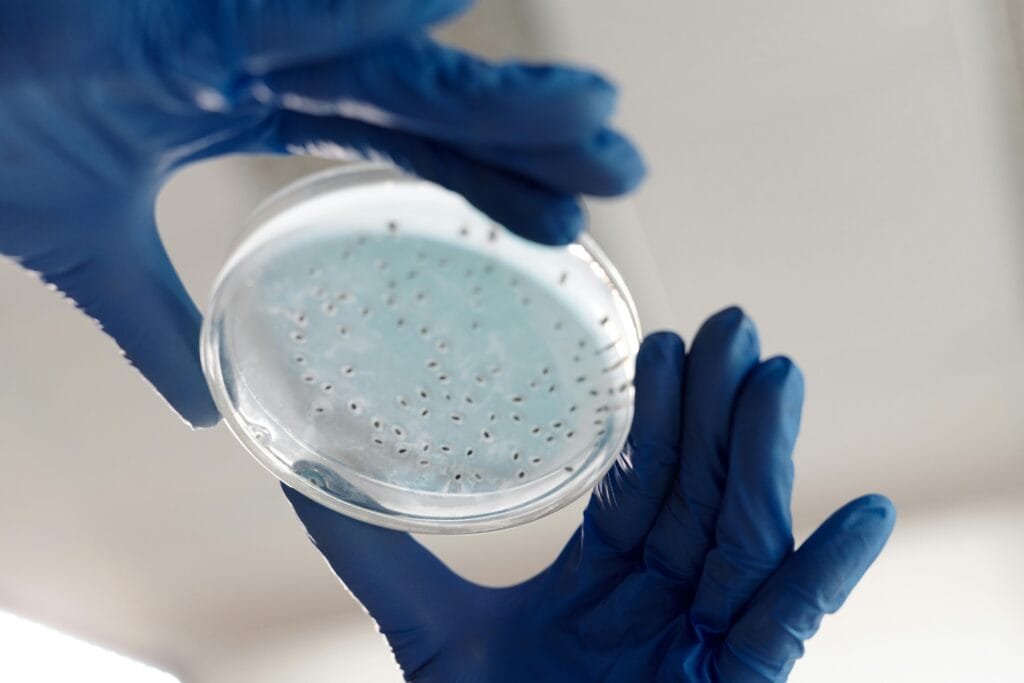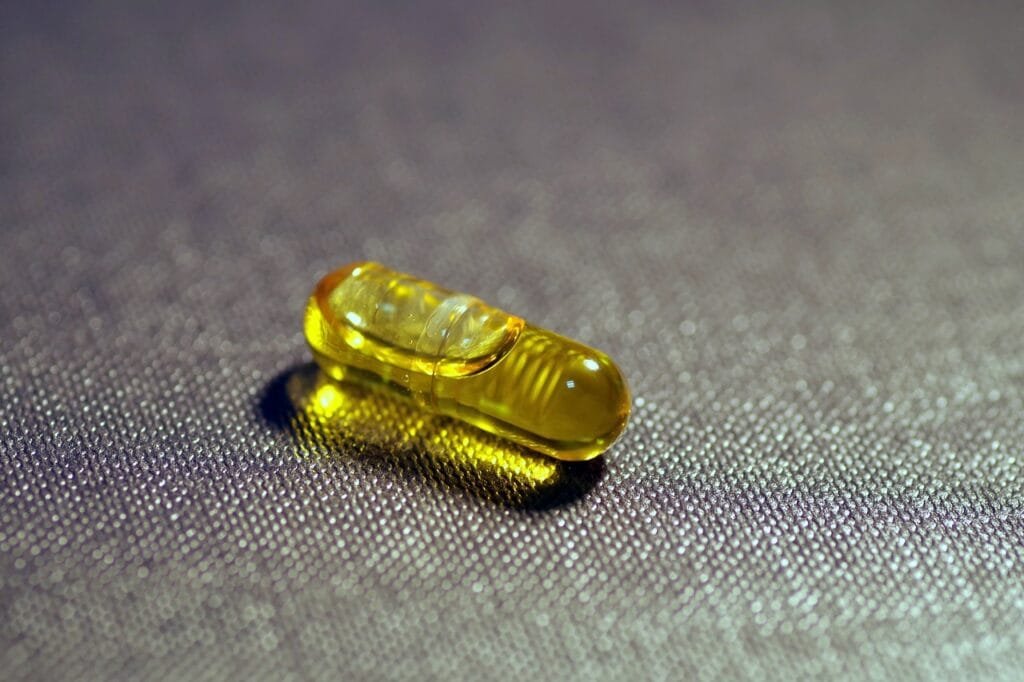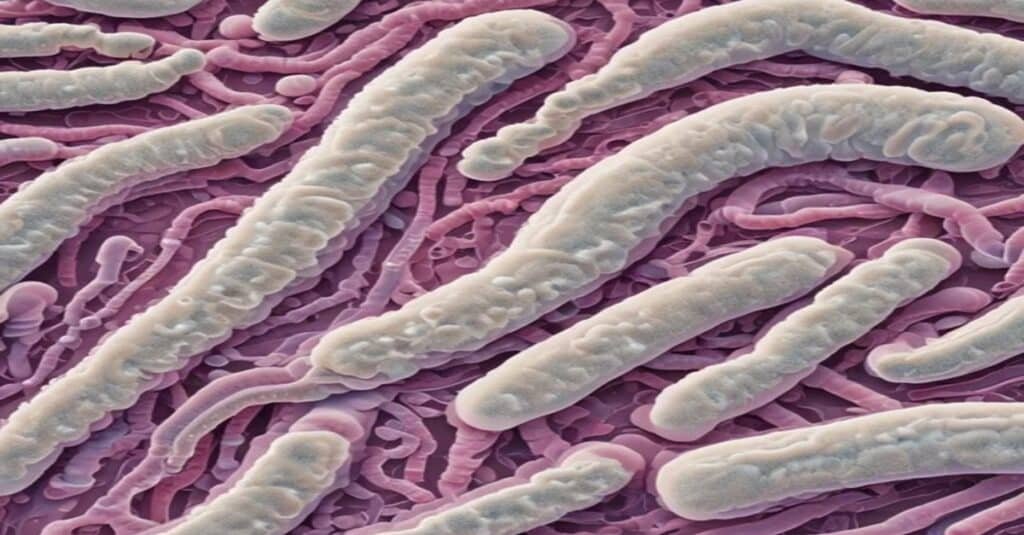Escherichia coli Nissle 1917: A non-pathogenic E. coli that’s actually good for you
You have probably heard about Escherichia coli by now, and it is clear that most news about this bacteria are not very optimistic. However, some might feel surprised that a variant of E. coli can also be found in supplements such as probiotics. Aren’t they harmful? Is using food products and supplements with a strain such as this safe?
People usually recognize Escherichia coli as a bacteria most people have in their intestines. It is a diverse group of bacteria we can find as normal flora in humans and animals. However, some strains of Escherichia coli can be harmful and cause diarrhea. You can also experience food poisoning when pathogenic E. coli stains food products. However, there are also beneficial E. coli species, such as Escherichia coli Nissle 1917.

These bacteria are called probiotics because they make up the normal flora in the intestines, which is fundamental for maintaining gastrointestinal health. But beyond gut health, you will see in this article how gut microbiota contributes to relieving inflammation, modulating the immune system, and much more.
The field of probiotics has recently expanded greatly, including many formerly unknown health applications. This shows the hidden potential behind microorganisms we always thought were pervasive for human health. Not all bacteria are the same, and probiotics are a good example.
What everyone should know about Escherichia coli Nissle 1917
Escherichia coli Nissle 1917, often abbreviated as EcN, is a non-pathogenic strain of E. coli, as mentioned in the introduction. Unlike its harmful counterparts, this particular strain does not produce toxins or cause any form of disease to its host. Quite the opposite, because it has been utilized for its beneficial effects on human health. We could say EcN is a beneficial bacteria in our gut microbiota and has great potential to solve various diseases when taken as a supplement.
This beneficial strain of E. coli was discovered during World War I by German physician Alfred Nissle. Hence, the name E. coli Nissle 1917 (E. Coli EcN) marks the year it was first mentioned academically. This strain was isolated from the feces of a soldier who remained healthy amidst a severe outbreak of shigellosis. The soldier was further studied to know why he was resistant to Shigella toxins when everyone else in the field was experiencing gastrointestinal symptoms, and this bacteria showed up as one of the possible reasons. This observation led to the hypothesis that E. Coli EcN possessed protective properties against intestinal pathogens and led the way to discovering the true potential of probiotics (1).
E. Coli EcN is characterized by its ability to colonize the human gut without disrupting the natural microbiota balance. The contrary is true because this strain contributes to the balance of good bacteria and prevents pathogenic bacteria’s growth and colonization. The strain exhibits a strong affinity for the mucosal lining of the intestines due to small structures called fimbriae that bind to the intestines almost instantly after reaching the gut (2). After adhering effectively, E. Coli EcN competes with pathogenic bacteria for their place in the gut. Moreover, to ensure no pathogenic bacteria affect their colonization capacity in the gut, E. Coli EcN produces antimicrobial substances, such as microcins, which inhibit the growth of harmful microorganisms (3).
Benefits and Health Applications of EcN
We already mentioned some benefits, mechanisms of action, and how E. Coli EcN contributes to the balance of good bacteria and pathogens in the intestinal lining. In short, E. Coli EcN can reverse intestinal dysbiosis, an alteration of the homeostasis in the gut microbiome.
Dysbiosis can manifest in different ways in the gut and beyond. Thus, the effects of E. Coli EcN on the human body can be felt in improving gastrointestinal symptoms and other health problems that apparently do not concern the intestines, as we will see further (4).
E. Coli EcN can relieve signs and symptoms of IBS and IBD
IBS and IBD are different health problems that people often confuse due to their similar names and nature. IBS stands for Irritable Bowel Syndrome, which causes abdominal pain and bloating due to hypersensitivity to some antigens in the gut. IBD stands for Inflammatory Bowel Disease, which can be broken down into Crohn’s disease and ulcerative colitis. Both feature chronic inflammation and damage in the gut that may reach the point of penetrating the intestinal wall and causing ulcers.
Studies have shown that E. Coli EcN can induce and maintain remission in patients with ulcerative colitis. In other words, when the supplement is administered, the disease symptoms improve, and if the patient has IBS, the time before symptoms return is lengthened. Its efficacy is comparable to standard treatments so we can use this probiotic alternative with fewer side effects (5).
Similarly, studies have reported significant symptom relief in patients suffering from IBS after using EcN probiotics, including reduced bloating and abdominal pain. EcN modulates the gut flora while enhancing the mucosal barrier function, relieving irritable bowel syndrome. When the gut’s barrier function is established, the intestinal linings are no longer permeable, and antigens can’t reach further, triggering hypersensitivity (6).
E. Coli EcN can reduce the incidence of dangerous infections such as Salmonella
Salmonellosis is a disease resulting from the infection of Salmonella typhi, a bacteria we can get from contaminated water and food sources. Mild cases can have moderate symptoms such as diarrhea and vomiting. Still, this bacteria can also travel through the bloodstream and cause a life-threatening disease with severe dehydration, osteomyelitis, endocarditis, and abscesses in the spleen or liver.
In an attempt to win the battle for a space in the intestinal lining, EcN produces specific bacteriocins, which are substances with innate antibacterial effects. They do not affect beneficial bacteria but inhibit the growth of pathogens such as Salmonella and Shigella. Also, the bacteria binds so tightly to the gut lining that it doesn’t leave space for pathogen colonization. This reduces the risk of gut infections, and if present, Salmonella inhibits its growth and is less likely to cause bacteremia (7, 8).
Another pathogen affected by EcN bacteriocins is Clostridium difficile. This bacteria is prevalent in hospitalized patients who have undergone antibiotic therapy for too long. It is an opportunistic infection that binds the intestinal lining because the gut microbiota has been depleted. By balancing gut microbiota and competing for space in the gut, EcN inhibits C. difficile colonization and helps patients recover faster from their infection (7,8).
E. Coli EcN improves the immune response while regulating inflammation
The immune system is the body’s line of defense against harmful pathogens, not only in the gastrointestinal system but throughout the body. The immune system should respond in a balanced way. A weak response may leave the body a victim of pathogenic bacteria, and an overreactive response may cause allergies and inflammation, which can damage tissue and harm the body. EcN and other probiotics can play a vital role in achieving this balance.
This strain of probiotics strengthens the immune system from its place in the gut. There are many connections between the gut and the immune system through the Gut-Associated Lymphoid Tissue or GALT. This vital link allows E. Coli EcN and other gut microbes to stimulate the production of antimicrobial peptides and promote the growth of immune cells. It also fortifies the intestinal barriers and prevents pathogens from reaching the bloodstream.
On the other hand, E. Coli EcN helps mitigate the effects of inflammation by regulating cytokine production. Cytokines are substances that provide a signal to immune cells and control immune responses. They are essential for fighting infections, but an excessive release of cytokines can trigger harmful inflammation. In this field, EcN reduces the risk of inflammatory disease by reducing the hyperactivity of immune cells to release cytokines, resulting in significant improvements in inflammation levels (9,10).
E. Coli EcN can help reduce food allergies and atopic dermatitis
Allergies are strongly related to inflammation because they are triggered by the immune system, but the cytokines responsible for allergies differ from those of mainstream inflammation. Allergic diseases, such as atopic dermatitis and food allergies, occur when our immune cells overreact against harmless substances in the belief that they are pathogens. Many studies currently show that EcN can modulate these cell responses, influencing immune system balance and preventing or relieving food allergies and atopic dermatitis.
Early studies of atopic dermatitis suggest that supplementing the infant’s body with EcN lowers the risk of having atopic dermatitis in the future. The reason behind this finding is that EcN contacts immune cells during the infant’s development and supports the normal release of cytokines. Years after, when the body gets in contact with allergens, the immune system cells won’t overreact to them because they have already been trained to maintain balance since their early development (11, 12).
Another field of research is food allergies, which affect infants and young patients. Supplementing EcN from a young age significantly reduces the risk of overactive immune reactions to products such as peanuts and seafood. Also, grown-up children and adults may benefit from EcN by reducing the frequency and severity of allergic responses to certain foods. This field is still under active study, but so far, EcN has shown promise in the prospect of using probiotics to manage allergic reactions (13).
Conclusion
E. coli Nissle 1917 has proven to be a unique and versatile probiotic with significant medical potential. Its promising ability to inhibit harmful pathogens, modulate the immune system, and provide support during antibiotic therapy makes it an essential ally in maintaining gastrointestinal health despite its long history on the probiotic shelf.
Beyond its current uses, ongoing research suggests that EcN could play a role in an even wider range of preventive and therapeutic strategies. Health applications range from improving immune resilience to reducing inflammation and supporting recovery from infections, and its applications continue to expand.
As such, E. coli Nissle 1917 is considered by many to be one of the first probiotics to be described formally in the medical literature. It exemplifies how beneficial bacteria behave in the human gut and shows that even old probiotics remain relevant in today’s supplement marketplace.
References:
- Nissle, Alfred. “Weiteres über grundlagen und praxis der mutaflorbehandlung.” DMW-Deutsche Medizinische Wochenschrift 51.44 (1925): 1809-1813.
- Lasaro, Melissa A., et al. “F1C fimbriae play an important role in biofilm formation and intestinal colonization by the Escherichia coli commensal strain Nissle 1917.” Applied and environmental microbiology 75.1 (2009): 246-251.
- Sonnenborn, Ulrich. “Escherichia coli strain Nissle 1917—from bench to bedside and back: history of a special Escherichia coli strain with probiotic properties.” FEMS microbiology letters 363.19 (2016): fnw212.
- Wang, Yurong, et al. “The administration of Escherichia coli Nissle 1917 ameliorates irinotecan–induced intestinal barrier dysfunction and gut microbial dysbiosis in mice.” Life sciences 231 (2019): 116529.
- Losurdo, Giuseppe, et al. “Escherichia coli Nissle 1917 in ulcerative colitis treatment: systematic review and meta-analysis.” J Gastrointestin Liver Dis 24.4 (2015): 499-505.
- Faghihi, Amir H., et al. “Efficacy of probiotic Escherichia coli Nissle 1917 in patients with irritable bowel syndrome: a double blind placebocontrolled randomized trial.” Acta Medica Indonesiana 47.3 (2015).
- Altenhoefer, Artur, et al. “The probiotic Escherichia coli strain Nissle 1917 interferes with invasion of human intestinal epithelial cells by different enteroinvasive bacterial pathogens.” FEMS Immunology & Medical Microbiology 40.3 (2004): 223-229.
- Bartram, Emma, et al. “Enhancing the antibacterial function of probiotic Escherichia coli Nissle: when less is more.” Applied and Environmental Microbiology 89.11 (2023): e00975-23.
- Jacobi, Christoph A., and Peter Malfertheiner. “Escherichia coli Nissle 1917 (Mutaflor): new insights into an old probiotic bacterium.” Digestive diseases 29.6 (2011): 600-607.
- Arribas, B., Rodríguez‐Cabezas, M. E., Camuesco, D., Comalada, M., Bailón, E., Utrilla, P., … & Gálvez, J. (2009). A probiotic strain of Escherichia coli, Nissle 1917, given orally exerts local and systemic anti‐inflammatory effects in lipopolysaccharide‐induced sepsis in mice. British journal of pharmacology, 157(6), 1024-1033.
- Manzhalii, E., Hornuss, D., & Stremmel, W. (2016). Intestinal-borne dermatoses significantly improved by oral application of Escherichia coli Nissle 1917. World Journal of Gastroenterology, 22(23), 5415.
- Weise, C., Zhu, Y., Ernst, D., Kühl, A. A., & Worm, M. (2011). Oral administration of Escherichia coli Nissle 1917 prevents allergen‐induced dermatitis in mice. Experimental dermatology, 20(10), 805-809.
- Bickert, T., Trujillo-Vargas, C. M., Duechs, M., Wohlleben, G., Polte, T., Hansen, G., … & Erb, K. J. (2009). Probiotic Escherichia coli Nissle 1917 suppresses allergen-induced Th2 responses in the airways. International archives of allergy and immunology, 149(3), 219-230.
For information on probiotics click here.




